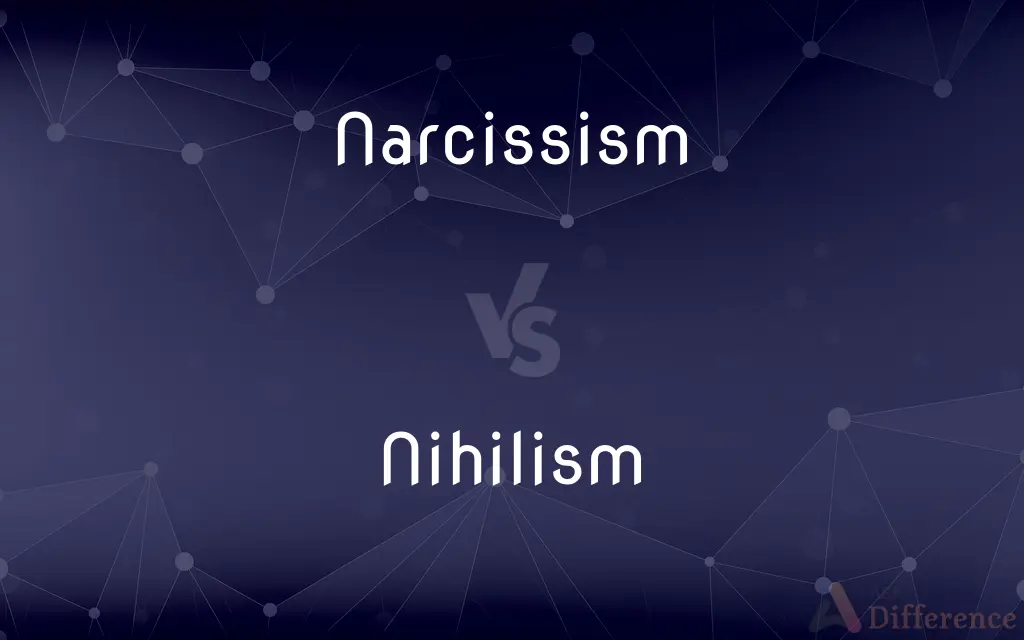Narcissism vs. Nihilism — What's the Difference?
By Tayyaba Rehman & Urooj Arif — Updated on April 25, 2024
Narcissism involves an excessive self-focus and need for admiration, while nihilism is a philosophical belief rejecting all religious and moral principles, often expressing a sense of life's meaninglessness.

Difference Between Narcissism and Nihilism
Table of Contents
ADVERTISEMENT
Key Differences
Narcissism is characterized by self-centeredness, with individuals often seeking attention and admiration from others. In contrast, nihilism focuses on the broader philosophical perspective that life lacks inherent meaning, values, or purpose.
Narcissists are typically very concerned with their image and how they are perceived, often believing they are superior to others. Whereas nihilists might disregard societal norms and values, seeing them as baseless or arbitrary.
In psychology, narcissism is viewed as a personality trait that can affect interpersonal relationships due to the narcissist’s lack of empathy and high need for admiration. Nihilism, however, is more about a philosophical or existential attitude towards life and does not necessarily impact personal relationships directly.
While narcissism can lead to destructive behavior if it becomes extreme, such as in narcissistic personality disorder, nihilism can lead to feelings of despair or pessimism but doesn’t inherently involve the mistreatment of others.
The motivational drivers are also different: narcissists are driven by the need to be recognized and feel superior, while nihilists might be driven by a quest for truth, often leading them to reject constructed meanings and values.
ADVERTISEMENT
Comparison Chart
Definition
Excessive interest in oneself and one's appearance
Belief in the meaninglessness of life and moral values
Focus
Self
Life and existence
Psychological impact
Affects interpersonal relationships
Affects worldview and existential perspective
Philosophical basis
Lacks
Central, often based on skepticism and realism
Common manifestations
Seeking admiration, lack of empathy
Rejection of religious, moral, or societal norms
Compare with Definitions
Narcissism
Lack of empathy and a sense of entitlement.
Her narcissism makes it hard for her to recognize others' feelings.
Nihilism
Associated with pessimism about general aspects of life.
Nihilism shapes his view that societal efforts are ultimately pointless.
Narcissism
Excessive admiration of oneself.
His narcissism is evident when he talks about his achievements without prompting.
Nihilism
Philosophical view that negates traditional beliefs.
His nihilism makes him skeptical of political and cultural narratives.
Narcissism
A psychological condition marked by self-centeredness.
Narcissism in leaders can sometimes blind them to the needs of their followers.
Nihilism
Rejection of all religious and moral principles.
His turn towards nihilism came after questioning the existence of moral absolutes.
Narcissism
A trait leading to a constant need for praise.
She displayed her narcissism by constantly fishing for compliments.
Nihilism
Belief that life has no intrinsic meaning or value.
Nihilism often leads to a profound existential crisis.
Narcissism
A focus on personal appearance and prestige.
His narcissism drives him to spend excessively on designer clothes.
Nihilism
Embracement of anarchy and skepticism.
Her nihilistic views incline her to challenge every established norm.
Narcissism
Narcissism is the pursuit of gratification from vanity or egotistic admiration of one's idealised self-image and attributes. The term originated from Greek mythology, where a young man named Narcissus fell in love with his own image reflected in a pool of water.
Nihilism
Nihilism (; from Latin nihil 'nothing') is a philosophy, or family of views within philosophy, expressing negation (i.e., denial of) towards general aspects of life that are widely accepted within humanity as objectively real, such as knowledge, existence, and the meaning of life. Different nihilist positions hold variously that human values are baseless, that life is meaningless, that knowledge is impossible, or that some set of entities do not exist, are meaningless, or pointless.The study of nihilism may regard it as merely a label that has been applied to various separate philosophies, or as a distinct historical concept arising out of nominalism, skepticism, and philosophical pessimism, as well as possibly out of Christianity itself.
Narcissism
Excessive preoccupation with or admiration of oneself.
Nihilism
(Philosophy) The doctrine that nothing actually exists or that existence or values are meaningless.
Narcissism
A personality disorder characterized by an exaggerated sense of self-importance, need for admiration, and lack of empathy. Also called narcissistic personality disorder.
Nihilism
Relentless negativity or cynicism suggesting an absence of values or beliefs
Nihilism in postwar art.
Narcissism
Pleasure derived from contemplation or admiration of one's own body or self, considered in psychoanalytic theory to be a fixation on or a regression to an infantile stage of development.
Nihilism
Political belief or action that advocates or commits violence or terrorism without discernible constructive goals.
Narcissism
Excessive love of oneself.
Nihilism
Also Nihilism A diffuse, revolutionary movement of mid-19th-century Russia that scorned authority and tradition and believed in reason, materialism, and radical change in society and government through terrorism and assassination.
Narcissism
An exceptional interest in and admiration for oneself.
Nihilism
(Psychiatry) A delusion, experienced in some mental disorders, that the world or one's mind, body, or self does not exist.
Narcissism
An exceptional interest in and admiration for yourself
Nihilism
The view that all endeavours are devoid of objective meaning.
Existential nihilism
Nihilism
The rejection of, or opposition to, religious beliefs, (inherent or objective) moral principles, legal rules, etc., often due to the view that life is meaningless (sense 1).
Moral nihilism
Nihilism
The rejection of non-proven or non-rationalized assertions in the social and political spheres of society.
Nihilism
A delusion that oneself or the world, or parts thereof, have ceased to exist.
Nihilism
Alternative case form of Nihilism
Nihilism
A doctrine grounded on the negation of one or more meaningful aspects of life; in particular, the view that nothing in the world actually exists.
Nihilism
(countable) Something that is regarded as meaningless.
Nihilism
Nothingness; nihility.
Nihilism
The doctrine that nothing can be known; scepticism as to all knowledge and all reality.
Nihilism
The theories and practices of the Nihilists.
Nihilism
A revolutionary doctrine that advocates destruction of the social system for its own sake
Nihilism
The delusion that things (or everything, including the self) do not exist; a sense that everything is unreal
Nihilism
Complete denial of all established authority and institutions
Common Curiosities
How do narcissism and nihilism differ in focus?
Narcissism focuses on the self, while nihilism addresses broader existential questions.
Can narcissism and nihilism coexist in a person?
While unusual, it’s possible for someone to exhibit narcissistic traits while also adhering to nihilistic beliefs.
What are the dangers of narcissism?
Narcissism can lead to damaging relationships and a lack of genuine connections due to self-centered behavior.
What is nihilism?
Nihilism is the philosophical belief that life and traditional values inherently lack meaning.
How do societal views generally regard narcissism and nihilism?
Both are often viewed negatively, but for different reasons: narcissism for its impact on relationships and nihilism for its perceived pessimism.
Are there therapeutic approaches to deal with narcissism?
Psychological therapies like cognitive behavioral therapy can help address and mitigate some aspects of narcissism.
Is there a societal benefit to either narcissism or nihilism?
While generally viewed as negative, both can challenge individuals and societies to reassess values and behaviors, potentially leading to growth or change.
How do cultural differences impact the perception of narcissism and nihilism?
Cultural values influence the acceptance and interpretation of narcissism and nihilism, with some cultures being more tolerant of self-promotion or skepticism than others.
What defines narcissism?
Narcissism is defined by an excessive self-focus and admiration for oneself.
How can narcissism affect professional life?
In a professional setting, narcissism can both aid and hinder success depending on whether the self-confidence perceived positively or the arrogance negatively.
How do philosophy and psychology view these concepts?
Philosophy explores nihilism as an existential question, while psychology examines narcissism as a personality feature.
What are the consequences of adopting a nihilistic viewpoint?
Nihilism can result in feelings of despair, detachment from societal goals, and a sense of purposelessness.
Can nihilism influence political beliefs?
Yes, nihilism can influence political beliefs, often leading to skepticism or rejection of traditional political systems.
How might someone overcome nihilistic feelings?
Engaging in meaningful activities, therapy, and philosophical exploration can help manage nihilistic feelings.
Are there historical figures who exemplified these traits?
Yes, many historical figures have shown traits of either narcissism or nihilism, often affecting their legacies and historical interpretations.
Share Your Discovery

Previous Comparison
Omeprazole vs. Pantoprazole
Next Comparison
Umpire vs. EmpireAuthor Spotlight
Written by
Tayyaba RehmanTayyaba Rehman is a distinguished writer, currently serving as a primary contributor to askdifference.com. As a researcher in semantics and etymology, Tayyaba's passion for the complexity of languages and their distinctions has found a perfect home on the platform. Tayyaba delves into the intricacies of language, distinguishing between commonly confused words and phrases, thereby providing clarity for readers worldwide.
Co-written by
Urooj ArifUrooj is a skilled content writer at Ask Difference, known for her exceptional ability to simplify complex topics into engaging and informative content. With a passion for research and a flair for clear, concise writing, she consistently delivers articles that resonate with our diverse audience.
















































